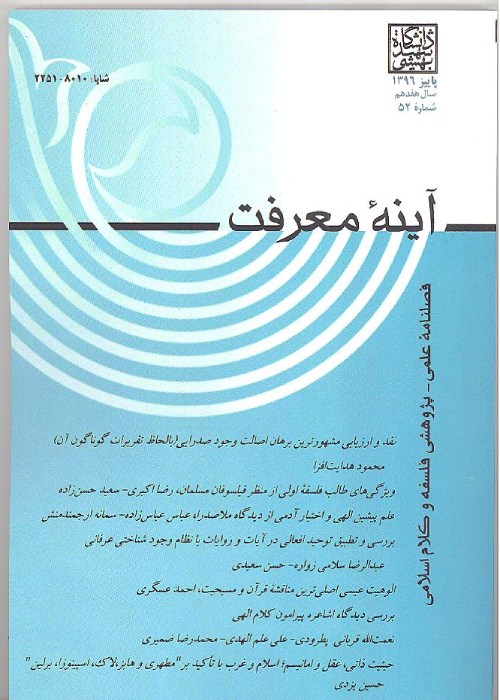Sam Harris’s Materialistic Interpretation of Free Will and its Criticism from Mûllā Ṣâdrā’s Viewpoint
Author(s):
Article Type:
Research/Original Article (دارای رتبه معتبر)
Abstract:
The problem of free will, which had been discussed by the ancient Greek philosophers, has been discussed in Islamic philosophy at length. For Muslim philosophers, the will is one of the faculties of soul, which causes the action by motivating the desire and making the bodily organs move. In recent decades, due to the great progress made in the field of neuroscience, some materialists have tried to use the findings of neuroscience for explaining their deterministic and materialistic viewpoint and interpreting the process of issuance of the action from a human being according to the neural changes in the body. Sam Harris is one of those who have taken such an approach, and by emphasizing on Libet’s findings and new experiments on the cerebral cortex as well as emphasizing on the factor of environment, considers the human behavior as arising from the environment and genetics, and denies the voluntary and free action. On the other hand, he considers the body as the origin of action and rejects the idea of “Mind” and “Soul”. In this paper, I have tried to criticize Harris’s viewpoint according to the foundations of Mûllā Ṣâdrā’s Transcendent Philosophy.FindingsSam Harris has tried to deny the human free will by focusing on the environment and genetics and considering it only an illusion. But, based on the philosophical foundations of Mûllā Ṣâdrā’s Transcendent Philosophy, Sam Harris’s viewpoint faces some major criticisms which makes it irrational and unacceptable. Emphasizing on the role of genetics, considering all behaviors as predictable by neurons, appealing to chance and randomness in justifying some behaviors, emphasizing on human unawareness of the origin of human actions, considering the behaviors as arising from the activities of body, ignoring the substance of the Mind (the Soul), and confusing determinism with compulsion are some of the cases which reject Harris’s materialistic viewpoint. The will is the crystallization of the soul, which distinguishes human beings from other creatures, and its function cannot be related to the neural activities of the body. Discussion and ConclusionSam Harris sees free will as only an illusion. By emphasizing on the findings of Benjamin Libet in his famous experiment and also by emphasizing on the role of the environment, Harris believes that we are not free agents in doing our actions and that it is genetics and the environment that determine how we must behave. Considering the free will as an illusion goes to the extent that Harris sometimes knows free will as mysterious or essentially meaningless. He emphasizes that free will has nothing to do with any kind of reality and that human beings have no awareness of the origin of their actions. Harris considers human actions as completely compulsory and the product of family, social and environmental conditions in which a person grows up. He, then, points out that human beings are unaware of the process of life and that the hidden dimensions of the mind, which are the origins of many behaviors, are hidden from us. This leads him to the denial of human freedom. On the other hand, Mûllā Ṣâdrā considers the will as one of the faculties of soul, and believes that it is not a material thing. According to Mûllā Ṣâdrā, a human being has free will, and the conscious and purposeful actions which issue from him indicate the existence of the faculty of will in his soul. And, in his view, the true will is a graded thing. Sam Harris’s materialistic interpretation of free will faces challenges and criticisms which make it an unreasonable and unjustifiable interpretation. His reliance on environment and genetics is the most important weakness of his materialistic interpretation of human free will, because it cannot negate the human free will.
Keywords:
Language:
Persian
Published:
Ayeneh Marefat, Volume:23 Issue: 76, 2023
Pages:
137 to 166
magiran.com/p2679112
دانلود و مطالعه متن این مقاله با یکی از روشهای زیر امکان پذیر است:
اشتراک شخصی
با عضویت و پرداخت آنلاین حق اشتراک یکساله به مبلغ 1,390,000ريال میتوانید 70 عنوان مطلب دانلود کنید!
اشتراک سازمانی
به کتابخانه دانشگاه یا محل کار خود پیشنهاد کنید تا اشتراک سازمانی این پایگاه را برای دسترسی نامحدود همه کاربران به متن مطالب تهیه نمایند!
توجه!
- حق عضویت دریافتی صرف حمایت از نشریات عضو و نگهداری، تکمیل و توسعه مگیران میشود.
- پرداخت حق اشتراک و دانلود مقالات اجازه بازنشر آن در سایر رسانههای چاپی و دیجیتال را به کاربر نمیدهد.
In order to view content subscription is required
Personal subscription
Subscribe magiran.com for 70 € euros via PayPal and download 70 articles during a year.
Organization subscription
Please contact us to subscribe your university or library for unlimited access!


